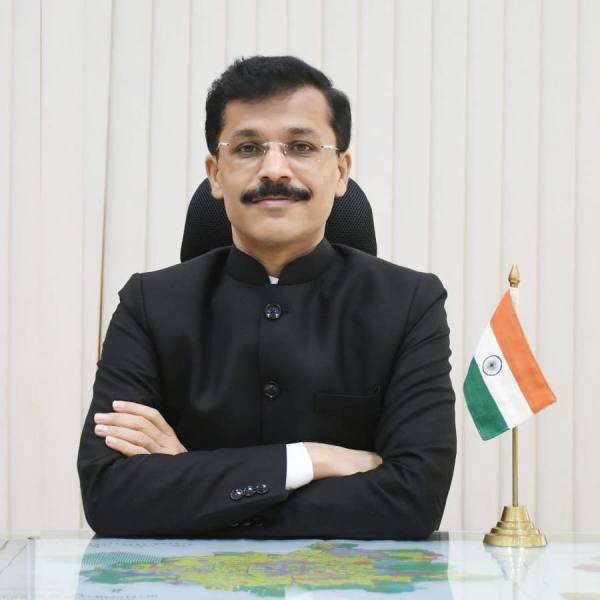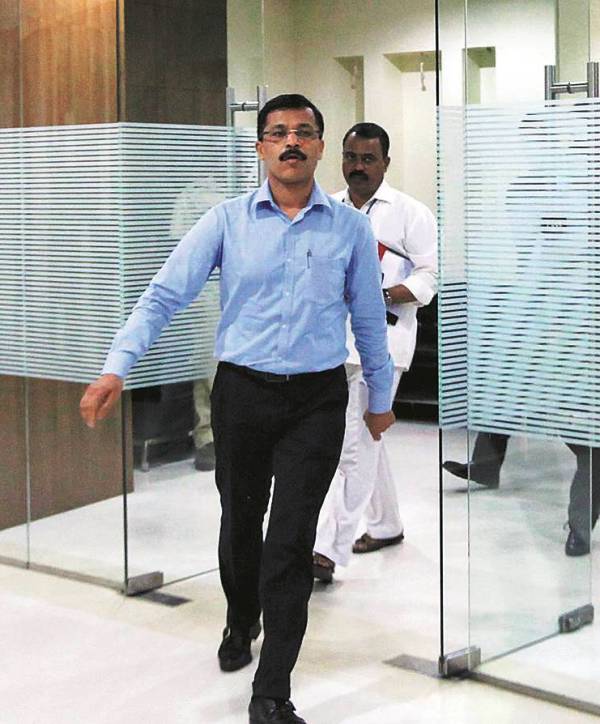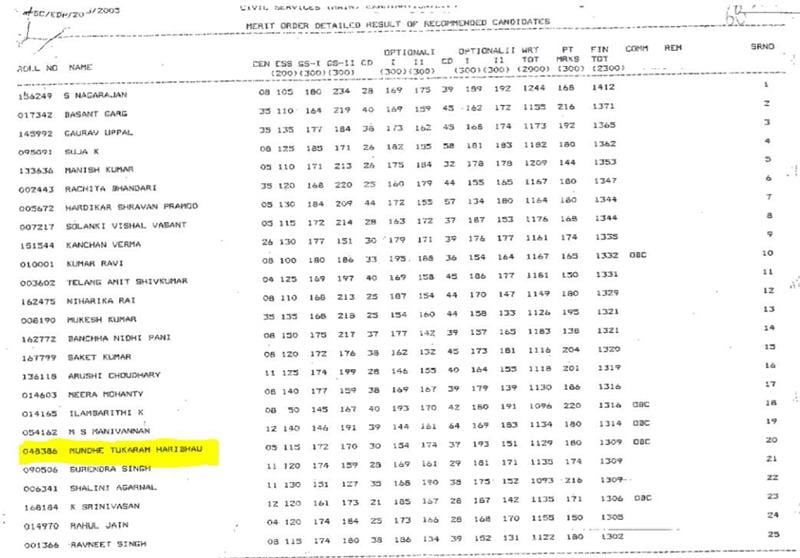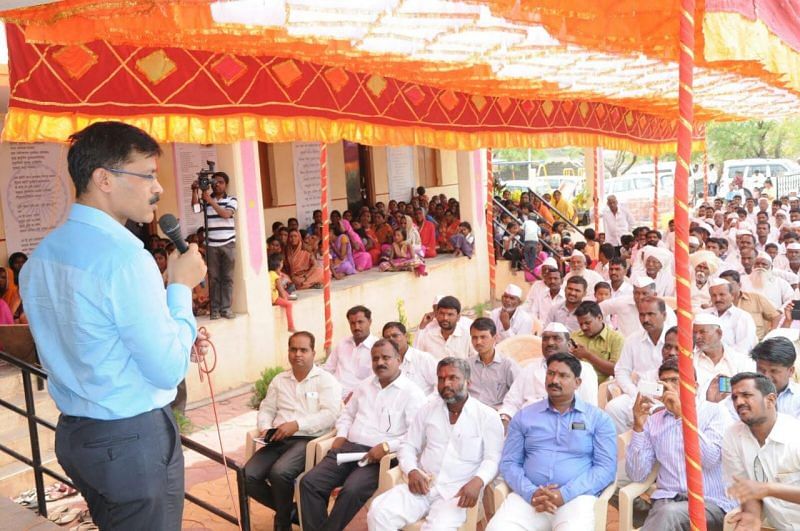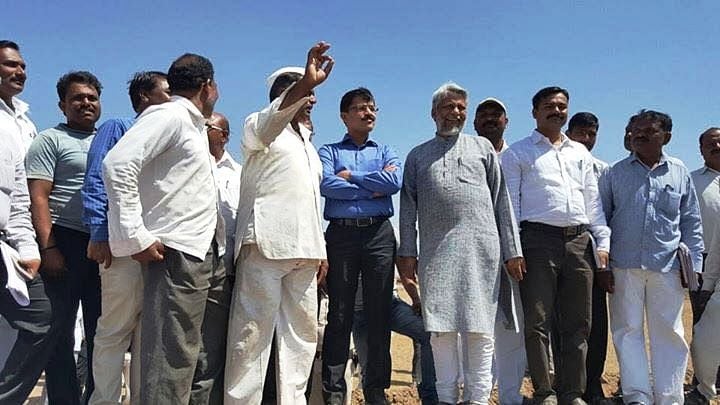Tukaram Mundhe (IAS) Age, Caste, Wife, Children, Family, Biography & More
| Bio/Wiki | |
|---|---|
| Full Name | Tukaram Haribhau Mundhe |
| Profession | IAS officer |
| Physical Stats & More | |
| Height (approx.) | in centimeters- 172 cm in meters- 1.72 m in feet & inches- 5’ 8” |
| Eye Colour | Black |
| Hair Colour | Black |
| Career | |
| Awards, Honours, Achievements | • The "Best Collector" (Solapur) for 2015-2016 by the Maharashtra Government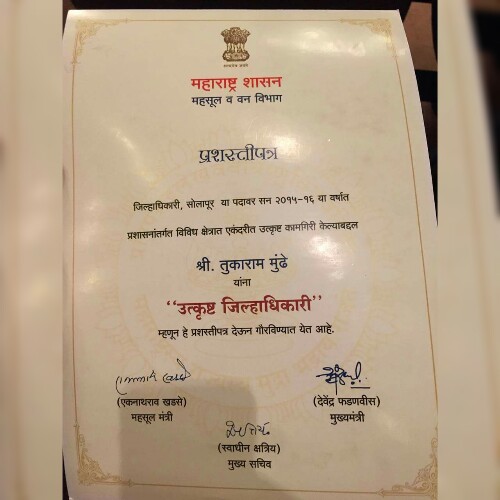 • "Waterman of Maharashtra" Award in the Administrative category by IBN Lokmat presented by the CM of Maharashtra in 2016. • The "Indian Express Excellence in Governance Award" that celebrated the finest work done by DMs across the country  |
| Personal Life | |
| Date of Birth | 3 June 1975 (Tuesday) |
| Age (as in 2020) | 45 Years |
| Birthplace | Tadsona village, Beed district, Maharashtra |
| Zodiac sign | Gemini |
| Nationality | Indian |
| Hometown | Tadsona village, Beed district, Maharashtra |
| School | Zilla Parishad School, Beed |
| College/University | Dr Babasaheb Ambedkar Marathwada University, Aurangabad |
| Educational Qualification(s) | • Bachelor’s degree in Political Science, Sociology, and History (from Dr Babasaheb Ambedkar Marathwada University, Aurangabad in 1996) • MA in Political Science (1998) |
| Caste | Vanjari [1]Vanjari Vivah |
| Controversies | • In October 2016, a no-confidence motion was passed against Tukaram Mundhe by the corporators who were the elected representatives of Navi Mumbai Municipal Corporation (NMMC). The corporators alleged that Tukaram didn't respect the elected representatives. They further described Tukaram to be of a dictatorial style who only believed in bureaucracy and did not believe in democratic values, and these were the reasons a no-confidence motion was passed against him. [2]The Financial Express • In August 2018, the elected representatives of Nashik Municipal corporation (NMC) led by BJP passed a no-confidence motion against Tukaram Mundhe. The letter alleged Tukaram to be taking decisions arbitrarily without bringing elected representatives into confidence. Speaking on the issue, Tukaram Mundhe said, "I have worked only as per law. My system of work does not threaten anyone but is based on prioritisation. In addition, it is time-bound and hence, result-oriented. I believe that this no-confidence motion is not against me but against good governance. Last six months I have been trying to put the systems in place. I have been working with utmost transparency. This work is process-driven and result oriented." [3]The Hindustan Times • On 8 June 2020, Ganeshpeth Police Station registered an FIR against the then civic chief Tukaram Mundhe for violating the lockdown restrictions by attending an event attended by 200 people. [4]The Times of India • On 28 June 2020, a former officer of Nagpur Smart and Sustainable City Development Corporation Ltd (NSSCDCL) lodged a police complaint against Tukaram Mundhe for humiliation and harassment. She wrote in her complaint that Mundhe wanted her to reveal some internal information about NSSCDCL department, to which she disagreed. This made Mundhe furious, and he started harassing her by making derogatory comments. [5]The Times of India |
| Relationships & More | |
| Marital Status | Married |
| Marriage Date | Year: 2009 |
| Family | |
| Wife/Spouse | Archana Mundhe |
| Parents | Father- Haribhau Mundhe Mother- Aasrabai Mundhe  |
| Siblings | Brother- Ashok Mudhe (Collector) |
| Children | Son- Agastya Mundhe Daughter- Ashana Mundhe  |
| Money Factor | |
| Salary (approx.) | Rs 1,44,000 (as an IAS officer) [6]embibe.com |
Some Lesser Known Facts About Tukaram Mundhe
- Tukaram Mundhe is a Maharashtra-cadre IAS officer of 2005-batch. He is known to be one of the most honest and upright officers in India.
- Tukaram Mundhe was born into a lower-middle-class farmer family that lived in a house built of mud brick. He spent his childhood working on his farms. His day began with early morning activity in the fields, followed by school and then back again in the farms. Unlike the other privileged kids, he couldn’t play after returning from school or even during the vacations.

- His village used to witness long power cuts, due to which he often had to wake up in the middle of the night (when the power would be back) to water the crops.
- From fencing to digging wells, to sowing seeds, to doing hefty tasks on the farms day and night and even during the days when the fields were folded, to selling farm produce in the market, he did it all.
- The best thing was that Mundhe never blamed his family for the hardships he had to go through during his childhood days. He always understood the situation in which his family lived. He says,
My mother was doing it, my father was doing it, so I was naturally inclined to do it. And I don’t think I did it grudgingly. I did it willingly. That discipline, indebtedness and way of functioning came into my life pretty early. I was very focused from the beginning, in my work and study.”
- It was after doing 10th class that Mundhe left his village and shifted to Aurangabad for higher studies.
- As Tukaram moved to Aurangabad, he experienced a cultural shock. A boy coming from a small village was unfamiliar with the modern way of life in the city. He was unaware of newspapers, malls, and cinemas. It was at the age of 16 that he saw a movie for the first time.
- Mundhe completed class 12 and subsequently took admission in a government college to pursue his graduation.
- After completing his graduation in 1996, Mundhe enrolled at State Institute for Administrative Careers, a training centre for civil services preparation in Mumbai, and simultaneously enrolled in post-graduation.
- Mundhe gave three attempts in the civil services exam between 1997 to 2000, but he failed to pass. Subsequently, he appeared for the State Civil Services Exam (MPSC) in 2001 and cracked it comfortably. He was selected for a class-2 post in Maharashtra finance department.
- Due to the prolonged joining process, he started teaching at a private college and taught there for two months. He then took up a contractual lectureship at Ismail Yusuf College in Mumbai and stayed there till 2003.
- In 2003, he left his contract job at Ismail Yusuf College and again started preparing for the Civil Services Examination. In 2004, he appeared for his last attempt of UPSC CSE. This time, he not only cleared it but also secured 20th rank among all the candidates. [7]cseplus.nic.in He was selected as an IAS officer and was allotted his home cadre in Maharashtra.
- Recalling his past, Mundhe says,
In between, my father got a paralytic attack in 2000. 2000-2004 was a very difficult time for me. But it’s times like these when your ability to make decisions come into play. It also helped me grow as an individual. Meanwhile, the MPSC training helped me to understand the functioning of the government to an extent.”
- As a part of his training, Tukaram received his first posting as Chief Officer of Municipality of Barshi block in Solapur. During his training, Tukaram took strong decisions and completed many major tasks. He demolished more than 15000 illegitimate encroachments, ceased unauthorised industries, stopped several illegal activities, etc. He also asked the citizen to follow law and order or else stay ready for strict action.
- After accomplishing his training, Mundhe was posted as an Assistant Collector of Deglur, Nanded. During his 4-month stint at Delgur, Mundhe improved water quality, addressed hundreds of pending public appeals, and took stringent actions against the sand mafias. Since then, Mundhe started receiving death threats and was provided with additional police security.
- He faced the wrath of powerful people as his actions disrupted their illegal businesses. Consequently, Mundhe was transferred to Nagpur where he joined as the CEO of Zilla Parishad. On the very first day of his posting, Mundhe visited some schools, which were closed as the teachers had gone to attend a meeting without intimidation. The next day, he suspended all the missing teachers from duty. After that, everyone started adhering to the rules and teachers’ absenteeism reduced from 12 percent to around 2 percent during his tenure. Similarly, he improved the medical facilities and also suspended on-duty doctors for irregularities in government schemes. The institutional deliveries in hospitals increased from 2 percent to 9 percent in his tenure. Mundhe also got married while he was posted there.
- Over the next few years, Mundhe worked as the additional tribal commissioner of Nashik (from March 2009 to July 2009), CEO of Zilla Parishad in Washim (from July 2009 to June 2010), CEO of KVIC in Mumbai (June 2010 to June 2011), and the collector and district magistrate of Jalna (June 2011 to September 2012). Mundhe continued his style of doing work and left a trail of good governance wherever he was posted.
- Tukaram Mundhe worked as the joint commissioner of Sales Tax (investigation division) of Mumbai from September 2012 to November 2014. He held the post for almost 26 months. It was the longest ever stint in his career. Reportedly, during his tenure, the department witnessed the highest ever tax recovery of Rs 310 crores, which was over double of the annual target.
- Thereafter, he was transferred to Solapur, a drought-prone district, which was fed by water tankers. Mundhe found out that the root cause of water scarcity was an unscientific and spontaneous usage of water resources in the area. He formulated a plan for water conservation involving three major principles, Area treatment, drained land treatment, and scientific use of water. He involved local people to take part and contribute to the program and turned it into a mass movement. The program also included a variety of incentives and disincentives according to the work done by people. As a result, with the contribution and participation of people, the drain line treatment was improved, and over thirty thousand wells were recharged in 282 villages.
- During Mundhe’s tenure in Solapur, open defecation problem was reduced, mining revenues were doubled, and the crop loans amounts also increased over three times. Seeing the significant amount of work done by Mundhe, he was awarded the best collector award by the then CM of Maharashtra, Devendra Fadnavis.
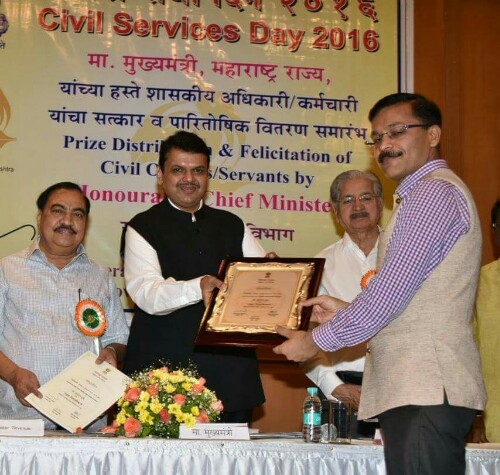
Former Maharashtra CM Devendra Fadnavis felicitating Tukaram Mundhe with The Best Collector award
- During his tenure as the Municipal Commissioner of Navi Mumbai, he started a variety of innovative initiatives and processes. These included; online grievance redressal system, ease of doing business, cashless initiatives, solid waste management initiatives, and walk with commissioner program.
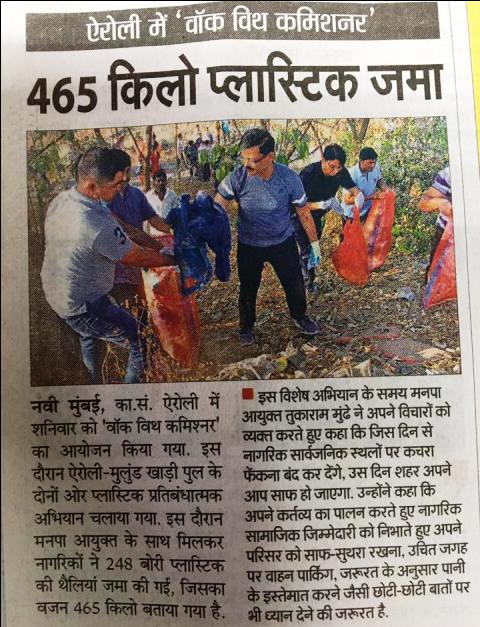
- Mundhe has seen a lot of transfers in his career, purportedly, most of them have been because of his friction with politicians. Till August 2020, Mundhe had been transferred for the 15th time in 15 years of his administrative service.
- His batchmates do not only see him as an honest, upright, and a hard taskmaster, but also as one who lacks a realistic approach. One of his batchmates said in an interview to The Times of India,
During our interaction with him, we always told him not to stretch certain issues too much. He did not heed our advice and now he is paying the price. We are in a democratic setup, we cannot ignore elected representatives. Transfer is part of Indian bureaucracy but 15 transfers in 15 years of service appear bad.”
References/Sources:

